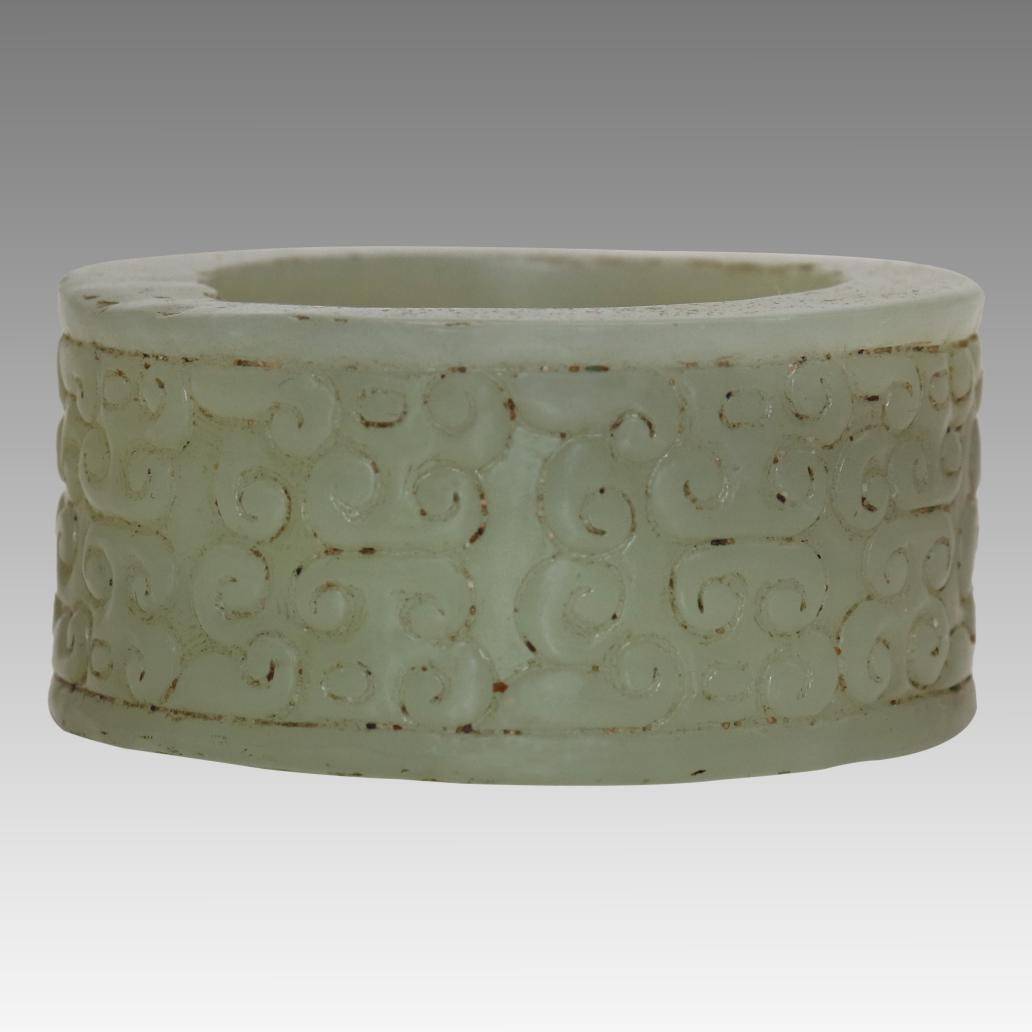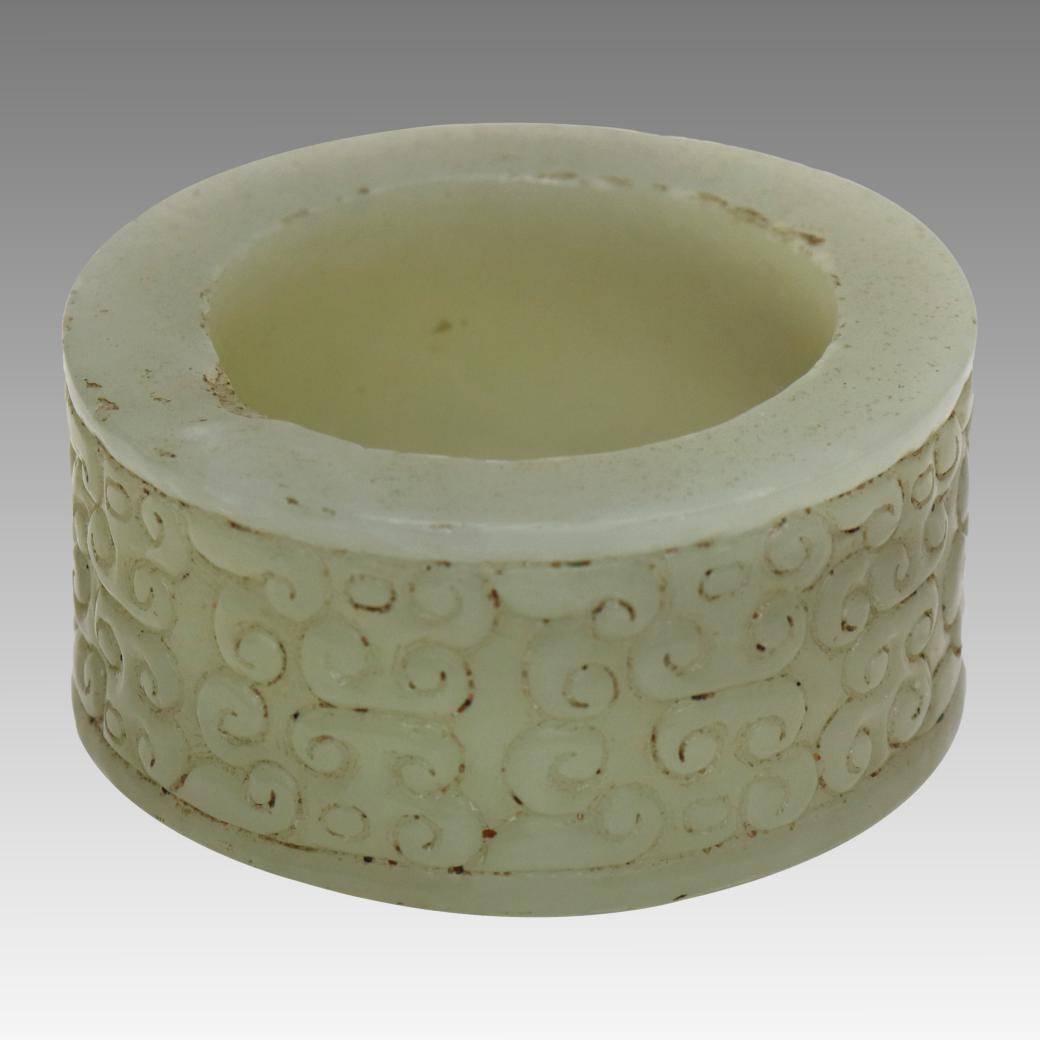|
玉是中国传统文化的一个重要组成部分,以玉为中心载体的玉文化,深深地影响了古代中国人的思想观念,成为中国文化不可缺少的一部分。 发源于新石器时代早期而绵延至今的“玉文化”是中国文化有别于世界其他文明的显著特点。中国人把玉看作是天地精气的结晶,使玉具有了不同寻常的宗教象征意义。取之于自然,琢磨于帝王宫苑的玉制品被看作是显示等级身份地位的象征物,成为维系社会统治秩序所谓“礼制”的重要构成部分。同时,玉在丧葬方面的特殊作用也使玉具有了无比的神秘宗教意义。而由于玉的外表及色泽,人们把玉本身具有的一些自然特性比附于人的道德品质,作为所谓“君子”应具有的德行而加以崇尚歌颂,更是中国人的伟大创造。因此,玉是东方精神生动的物化体现,是中国文化传统精髓的物质根基。 玉石具有无比的美丽,无比的坚硬,无比的价值,它与上古先民思想中至上的祖先、至上的自然力、至上的鬼神的观念自然而然地联系在一起了。古代护身符一类的东西正是循着这一自然过程而产生的。在此后的社会发展进程中,更产生了许许多多和玉紧密关联的神话和传说,这都表明在古时候人们的思维想象当中,一块美玉,它对天地四方、对列祖列宗、对电闪雷鸣、对万物生灵都有说不尽的联系和影响力量,这确是一个很重要的飞跃。大量古代的文字记载和大量的出土文物,都在证明着这样一个史实:一块玉、一件件小小的饰物、一点最原始的审美意识和一种最早的信念和虔诚,都不断地被赋于了新的含义,发生着新的作用,并终于孕育了中国特有的玉文化。 此次公司有幸征集到了一件汉代玉环。此物外径5.3CM,内径3.5CM,高2.5CM。釉和田白玉制作而成,质地温润洁白,白中透青。这件玉环形制小巧,过前人精心盘玩,感觉已脱胎换骨,透光下色泽更为优美。玉环较为厚实,外边缘及内边缘均凸起阴线,形成圆形。玉环双面施工,雕勾云纹,也有学者将此类纹饰称为变体蟠虺纹。此勾云纹朵朵粗大,云头凸起而饱满,雕刻刀痕宽且深,不同于战汉时期密实细腻的勾云纹。同类纹饰在汉朝时期玉璜、玉玦及其他玉饰中可见,为典型的汉代勾云纹特征。 次玉环提现了年代久远的古拙之美。双面雕琢勾连云纹,云头凸起,互相连接的曲线弯曲有度,细作凸雕,排布在器身之上,形成自内向外的扩张感。可想工匠在雕琢加工之时需要考虑纹理变化与造型艺术,堪为西汉时期佳作。
玉环最早出现于新石器时代晚期,是礼天之物,随着时代发展,逐渐体量变小,适合于日常佩戴,与玉璜、串珠一并成为装饰玉器。清代由上古时代所流传的玉环,体量较小者恰好便于系挂,可作为腰间配饰,日常把玩。经年累月包浆醇厚,成为人文雅士的心头之好。此件藏品将会现身于2021年新加坡迎春拍中,欢迎大家竞买! Jade is an important part of Chinese traditional culture. Jade culture, with jade as the central carrier, deeply influenced the ancient Chinese people's ideas and became an indispensable part of Chinese culture. The jade culture, which originated in the early Neolithic Age and continues till now, is a distinctive feature of Chinese culture which is different from other civilizations in the world. Chinese people regard jade as the essence of heaven and earth, which makes jade have unusual religious symbolic significance. Jade products taken from nature and pondered in imperial palaces are regarded as symbols of hierarchical status and become an important part of the so-called "ritual system" that maintains the social ruling order. At the same time, the special role of jade in funeral also makes jade have incomparable mysterious religious significance. Because of the appearance and color of jade, people compare some natural characteristics of jade with people's moral quality, and praise it as the virtue that a so-called "gentleman" should have, which is a great creation of Chinese people. Therefore, jade is the vivid embodiment of oriental spirit and the material foundation of the essence of Chinese cultural tradition. Jade has incomparable beauty, incomparable hardness and incomparable value, which is naturally linked with the concept of supreme ancestors, supreme natural forces and supreme ghosts and gods in ancient ancestors' thoughts. Ancient amulets and the like are produced just following this natural process. In the process of social development since then, there have been many Shinhwa and legends closely related to jade, which all show that in ancient people's thinking and imagination, a piece of beautiful jade has inexhaustible contact and influence on the four sides of heaven and earth, ancestors, thunder and lightning, and all living things. This is indeed a very important leap. A large number of ancient written records and a large number of unearthed cultural relics all prove such a historical fact: a piece of jade, a piece of small ornaments, a little primitive aesthetic consciousness and an earliest belief and piety have been constantly given new meanings and played new roles, and finally gave birth to China's unique jade culture.
This time, the company had the honor to collect a piece of Yuhuan in Han Dynasty. It has an outer diameter of 5.3CM, an inner diameter of 3.5CM and a height of 2.5CM. Glaze and white jade are made. The texture is warm and white, and the white is transparent. This Yuhuan is small in shape and has been carefully played by predecessors. It feels completely reborn, and its color is more beautiful under light transmission. Yuhuan is thick, and its outer edge and inner edge are convex with yin lines, forming a circle. Yuhuan is constructed on both sides and carved with cloud patterns. Some scholars also call this kind of decorative pattern as variant flat pattern. This gouyun pattern is thick and thick, with convex and full cloud heads. The carved knife marks are wide and deep, which is different from the dense and delicate gouyun pattern in the Han Dynasty. Similar ornamentation can be seen in Yuhuang, Yujun and other jade ornaments in Han Dynasty, which is typical of Gouyun pattern in Han Dynasty.
Sub-Yuhuan shows the beauty of Gu Zhuo. Carved on both sides to connect the cloud patterns, the cloud heads are convex, and the connected curves are curved and finely carved, which are arranged on the body to form a sense of expansion from inside to outside. It can be thought that craftsmen need to consider texture changes and plastic arts when carving, which is a masterpiece in Western Han Dynasty. Yuhuan, which first appeared in the late Neolithic Age, is a gift to heaven. With the development of the times, it has gradually become smaller and suitable for daily wear. Yuhuan, together with Yuhuang and beading, has become a decorative jade. Yuhuan, which was spread from ancient times in Qing Dynasty, is easy to hang and can be used as waist accessories for daily play. Over the years, the patina is mellow, which has become the heart of the humanities and elegant people. This collection will appear in the Spring Festival Auction in Singapore in 2021. You are welcome to bid! (责任编辑:开钫) |



